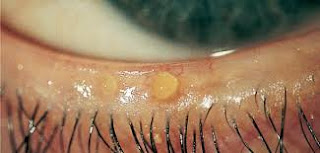Nursing Care Plan for Blepharitis
Blepharitis or better known as inflammation of the eyelids is one of the eye diseases to watch out for. The disease is caused by the oil glands at the base of the lashes were damaged, causing itching in the eyelids, irritation, even to inflammation. If this is allowed then it would be blepharitis.
Although blepharitis does not cause permanent damage to the eye, but very disturbing activities of our vision.
Symptoms of Blefarits as follows:
- The eyelids are often greasy.
- Itch on the eyelids.
- Burned in the eye.
- Eyes look red.
- Frequent watery eyes.
- Eye swelling of the eyelids.
- Eyelash gross waking.
- Very sensitive to light.
- Have peeling skin around the eyes.
- Eyelashes fall out.
- Eyelashes abnormal and irregular direction.
Main causes of the occurrence of blepharitis (inflammation of the eyelids)
- Infected by the bacteria.
- Glands damaged eye.
- Dandruff of the scalp to eyebrows.
- Rosacea.
- Allergic to something eg eye drops, eye lens.
Nursing Diagnosis and Interventions for Blepharitis :
Disturbed Sensory Perception (visual) related to reception interference status sensory organs.
Goal: Increase the visual acuity within the limits of individual situations.
Expected outcomes:
- Know the sensory disturbances and compensate for changes.
- Identify / fix potential hazards in the environment.
Intervention:
1) Determine the visual acuity, note whether one or both eyes are involved.
Rational: individual needs and choice of interventions varied causes vision loss occurs slowly and progressively.
2) Observe the signs and symptoms of disorientation.
Rational: woke up in unfamiliar surroundings and have limited vision.
3) Orient the patient on the environment, other people in the area.
Rationale: provides increased comfort and familiarity.
4) Notice about blurred vision and eye irritation, which can occur when using eye drops.
Rational: impaired vision / irritation can end 1-2 hours after use of eye drops, gradually decreases with usage.
5) Place the items needed / call bell within reach positions on the near side.
Rational: allowing patients to see objects more easily and facilitate the call for help when needed.



